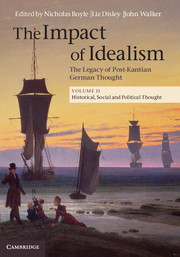Book contents
- Frontmatter
- Contents
- List of Contributors
- Acknowledgements
- List of Abbreviations
- Introduction: Idealism in historical, social and political thought
- 1 From transcendental idealism to political realism
- 2 The public of the intellectuals – from Kant to Lyotard
- 3 Idealism and the idea of a constitution
- 4 German Idealism and Marx
- 5 Ethos, nature and education in Johann Erich von Berger and Friedrich Adolf Trendelenburg
- 6 The concept and philosophy of culture in Neo-Kantianism
- 7 After materialism – reflections of Idealism in Lebensphilosophie: Dilthey, Bergson and Simmel
- 8 ‘Rationalisation’, ‘reification’, ‘instrumental reason’
- 9 Freedom within nature: Adorno on the idea of reason's autonomy
- 10 German neo-Hegelianism and a plea for another Hegel
- 11 Idealism and the fascist corporative state
- 12 Love and recognition in Fichte and the alternative position of de Beauvoir
- 13 Hegel's concept of recognition and its reception in the humanist feminism of Simone de Beauvoir
- 14 Giving an account of oneself amongst others: Hegel, Judith Butler and social ontology
- 15 Idealism in the German tradition of meta-history
- Bibliography
- Index
- References
Introduction: Idealism in historical, social and political thought
Published online by Cambridge University Press: 05 December 2013
- Frontmatter
- Contents
- List of Contributors
- Acknowledgements
- List of Abbreviations
- Introduction: Idealism in historical, social and political thought
- 1 From transcendental idealism to political realism
- 2 The public of the intellectuals – from Kant to Lyotard
- 3 Idealism and the idea of a constitution
- 4 German Idealism and Marx
- 5 Ethos, nature and education in Johann Erich von Berger and Friedrich Adolf Trendelenburg
- 6 The concept and philosophy of culture in Neo-Kantianism
- 7 After materialism – reflections of Idealism in Lebensphilosophie: Dilthey, Bergson and Simmel
- 8 ‘Rationalisation’, ‘reification’, ‘instrumental reason’
- 9 Freedom within nature: Adorno on the idea of reason's autonomy
- 10 German neo-Hegelianism and a plea for another Hegel
- 11 Idealism and the fascist corporative state
- 12 Love and recognition in Fichte and the alternative position of de Beauvoir
- 13 Hegel's concept of recognition and its reception in the humanist feminism of Simone de Beauvoir
- 14 Giving an account of oneself amongst others: Hegel, Judith Butler and social ontology
- 15 Idealism in the German tradition of meta-history
- Bibliography
- Index
- References
Summary
There is no clearer indication that Idealism is a tradition, and that the tradition is still alive, than the current condition of historical, social and political thought in the English- and German-speaking worlds. Through its intellectual idiom as much as its characteristic philosophical themes – the tension between individual freedom and political authority; the relationship between personal and social identity; the competing claims of universal human rights and particular cultural allegiance – that tradition continues to inform a vast spectrum of political, cultural and philosophical debates in an increasingly globalised world. Indeed it offers one of the most powerful idioms for understanding the phenomenon of globalisation itself. We can understand this continuing legacy only by grasping Idealism as a continuous tradition. The impact of Idealism is a hermeneutic conversation which defines its own terms and, at least in part, the social and cultural values, procedures and institutions which make that conversation possible. A common theme of these essays is that the trajectory of German Idealist philosophy in its classical age; the uneven but still effective transmission of that philosophy to the present; and our current engagement with what we have received, can only be understood in relation to each other and as part of a continuing debate. To separate the content of the legacy from the terms of the bequest, to abstract any particular emphasis of the Idealist heritage from the whole, is to risk turning truth into ideology: a living tradition into a dead letter.
At the beginning of the twentieth century, Benedetto Croce famously asked ‘What is living and what is dead of the philosophy of Hegel?’ He concluded that Hegel's philosophy of history, politics and the state, which he took to be the logical conclusion of the political and historical thought of German Idealism, exemplified what was most dead: that is, most constrained by the cultural idiom of its time, and therefore least relevant to the most urgent concerns of the modern world. The political, social and historical insights of German Idealism are now widely recognised to be very much alive. But that living presence can be realised only if we see the Idealist tradition as a continuous dialectic: one whose idea continues to be relevant only if it is never reified, as its terms are constantly redefined through actual experience. That is what ‘Idealism’ means.
- Type
- Chapter
- Information
- The Impact of IdealismThe Legacy of Post-Kantian German Thought, pp. 1 - 11Publisher: Cambridge University PressPrint publication year: 2013

